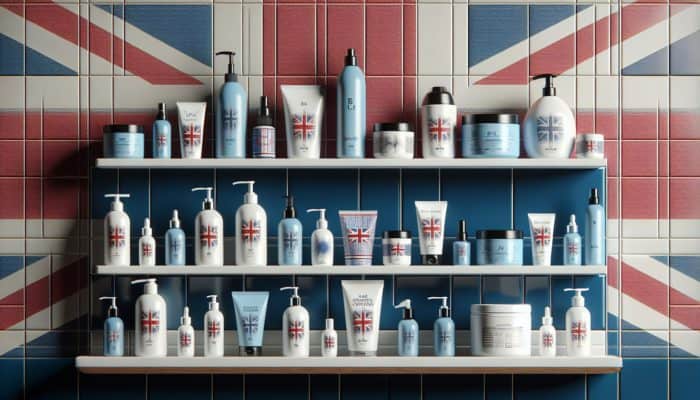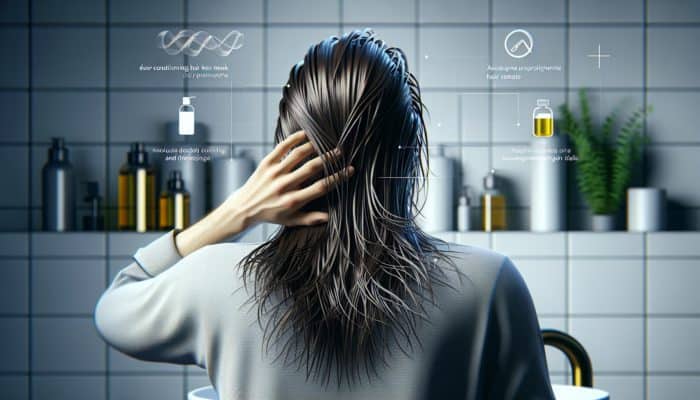Unlock the Secrets to Identifying Your Unique Hair Type for Tailored Care and Treatments
Embarking on your hair care regimen in the UK requires a comprehensive understanding of your individual hair type, which serves as the foundation for achieving optimal results. Just as one must understand a vehicle's mechanics before driving, it is equally essential to explore the specifics of your hair. Begin by closely examining your hair’s texture, density, and porosity. Identifying these key characteristics is vital; it empowers you to customise your hair care routine in a manner that transforms the start of your hair care journey into a rewarding and enjoyable experience.
Dive Deep into the Fundamental Characteristics of Your Hair

To develop a strong understanding of your hair type, start by assessing its texture. Is your hair straight, wavy, curly, or coily? Each of these hair textures has unique traits and specific maintenance requirements. For instance, straight hair generally requires less moisture compared to curly hair, which often tends to be drier due to natural oils having difficulty travelling the length of the hair shaft. Additionally, consider the density of your hair; do you have thick, medium, or fine strands? This factor plays a crucial role in how well your hair holds styles and influences your washing frequency. Moreover, porosity affects how effectively your hair absorbs and retains moisture—low-porosity hair tends to resist moisture, while high-porosity hair absorbs it quickly, making it more prone to damage. Recognising these attributes is essential for selecting the most suitable products to enhance your hair care routine.
In-Depth Analysis of the Four Primary Hair Types and Their Unique Requirements
Having laid the groundwork, it is time to embark on a detailed examination of the four primary <a href="https://limitsofstrategy.com/hair-types-unlocking-better-treatment-solutions/">hair types</a>. Straight hair is known for its sleek and glossy appearance, but it can sometimes appear dull without the right products to boost its vibrancy. Wavy hair strikes a beautiful balance between volume and texture, making it one of the most versatile hair types available. Curly hair is characterised by its significant body and bounce; however, it is more susceptible to frizz if not adequately cared for. Lastly, coily hair boasts a highly textured structure that demands extra moisture and care to prevent breakage. Understanding the specific needs of each hair type is crucial for selecting the right products, ensuring your hair care journey is both effective and enjoyable.
The Importance of Expert Advice in Your Hair Care Journey
While self-assessment is undoubtedly beneficial, insights from a professional hairstylist can provide invaluable direction. A stylist can conduct a thorough evaluation of your hair type and offer personalised recommendations tailored to your individual needs. They can suggest specific products and techniques that you may not have previously considered, ensuring your hair care regimen achieves optimal results. Many salons offer consultations, so take advantage of this opportunity, especially if you feel overwhelmed by the vast selection of products available on the market.
Identify the Must-Have Hair Care Products for Maximum Efficacy

Selecting the right products is crucial for the success of your hair care routine. Without the appropriate regimen, even the most diligent efforts may not yield satisfactory results. Understanding which essential hair care products are best suited to your specific hair type is a critical step in establishing a hair care routine in the UK that truly delivers visible outcomes.
How to Choose the Perfect Shampoo Specifically for Your Hair Type
Selecting the ideal shampoo is a fundamental aspect of any successful hair care routine. Different hair types require unique formulations to thrive. For example, if you have oily hair, a clarifying shampoo that effectively removes excess oil and product build-up is essential. Conversely, dry hair greatly benefits from hydrating shampoos designed to infuse moisture. Look for nourishing ingredients such as aloe vera or coconut oil, which cleanse while providing hydration. Additionally, consider the condition of your scalp; those dealing with dandruff should seek shampoos with anti-fungal properties, while individuals with sensitive scalps may prefer gentle, sulfate-free options that cleanse without causing irritation or discomfort.
The Essential Role of Conditioning in Maintaining Hair Health
Conditioning is a vital component in preserving hair health. A quality conditioner works to replenish moisture, making your hair more manageable and easier to style. It’s important to select a product that aligns with your hair type. For example, fine hair may benefit from lightweight conditioners that won’t weigh it down, while thicker, coarser hair may require richer, creamier formulations to ensure adequate moisture retention. Incorporating a conditioner into your daily routine not only enhances the texture of your hair but also strengthens strands against damage caused by styling tools and environmental factors, promoting long-lasting hair vitality and health.
Boost Your Hair Care Routine with Additional Treatments for Enhanced Results

To elevate your hair care routine, consider incorporating extra treatments such as hair masks or nourishing oils. These products specifically target issues like dryness, damage, or lack of shine. For instance, a deep conditioning mask can work wonders for brittle hair, while a nourishing oil can help tame frizz and protect against heat damage. Regularly using these treatments can significantly enhance the overall health and appearance of your hair, making them essential components of your hair care arsenal.
Maximising Hydration with Leave-In Conditioners for Daily Moisture Maintenance
Leave-in conditioners can transform the way you maintain hydration throughout the day. They provide continuous moisture and protection, especially beneficial for individuals with curly or coily hair types that tend to dry out quickly. When selecting a leave-in conditioner, choose products enriched with proteins and hydrating ingredients such as shea butter or jojoba oil. Applying a leave-in conditioner after washing can assist with detangling hair, minimising frizz, and forming a protective barrier against environmental stressors. This simple addition to your routine can ensure your hair remains healthy, hydrated, and visually stunning.
The Vital Importance of Heat Protectant Sprays During Styling Sessions
Before using any heat styling tools, it is essential to apply heat protectant sprays. These products create a barrier between your hair and the damaging effects of heat, safeguarding the integrity of your strands. Choose a protectant suitable for your hair type; for example, fine hair may benefit from a lightweight spray, while thicker hair might require a cream formulation for enhanced protection. Applying a heat protectant not only shields your strands but also optimises your styling results, ensuring your hair looks fabulous while feeling fantastic.
Establishing Reliable Daily Hair Care Practices for Lasting Results
Creating a consistent daily routine is crucial for maintaining hair health, particularly when establishing a hair care routine in the UK. Implementing effective habits can substantially improve your hair’s condition, allowing it to feel vibrant and look its very best.
Determining Your Optimal Washing Frequency Based on Hair Type
The frequency with which you wash your hair should be tailored to your hair type, scalp condition, and lifestyle. Oily hair may necessitate more frequent washing, possibly every other day, while dry or textured hair might only need washing once a week. Over-washing can strip your hair of its natural oils, resulting in dryness, while under-washing can lead to product build-up and dandruff. It’s crucial to pay attention to your hair and adjust your washing schedule based on its response and condition over time.
Implementing Proper Washing Techniques for Optimal Hair Health
The technique you use to wash your hair greatly impacts its overall health. Start by thoroughly wetting your hair with warm water to open the cuticles, allowing for effective cleansing. Use a small amount of shampoo, focusing on the scalp, and let the lather cleanse the lengths of your hair as you rinse. Avoid piling your hair on top of your head, as this can lead to tangles and breakage. Follow up with a conditioner, applying it mainly to the mid-lengths and ends to prevent greasiness at the roots. Rinse thoroughly and consider finishing with a cool rinse to seal the cuticles, adding shine and smoothness to your hair.
Selecting the Best Drying Techniques for Enhanced Hair Health
The method you choose to dry your hair can have lasting effects on its health and appearance. While air drying is the gentlest approach, it may require significant time, particularly for thicker hair types. If blow-drying is your preference, ensure you use a heat protectant and a nozzle attachment for focused airflow. Always dry your hair gently, avoiding vigorous rubbing with a towel, as this can contribute to frizz and breakage. Instead, consider using a microfiber towel or an old t-shirt to absorb excess moisture without causing damage. By adopting mindful drying practices, you can significantly improve your hair's health and appearance over time.
Styling Your Hair While Safeguarding Its Integrity
Styling your hair should never compromise its health. With the right techniques and tools, you can achieve your desired look without jeopardising your hair’s integrity. Mastering how to style and protect your hair is crucial when learning how to start a hair care routine in the UK.
Selecting the Right Styling Tools for Your Hair Type
Choosing the appropriate styling tools is essential for minimising damage to your hair. Always opt for high-quality products that cater specifically to your hair type. For instance, if your hair is coarse, a wide-toothed comb can help prevent breakage, whereas those with fine hair may benefit from a fine-toothed comb for precise styling. When it comes to heat tools, look for those with adjustable temperature settings, as excessive heat can be detrimental to your hair’s health. Investing in quality products can significantly reduce the risk of damage, allowing your hair to not only look fabulous but also remain healthy and strong.
Mastering Various Styling Techniques for Beautiful Hair
Learning diverse styling techniques can greatly enhance your hair styling capabilities. Blow-drying, curling, and straightening each require specific methods to minimise damage effectively. For blow-drying, use a round brush to lift the roots and create volume. A flat iron should only be applied to dry hair, preferably with a heat protectant to shield against damage. Curly hair may benefit from curl-enhancing creams applied to wet hair before diffusing to achieve defined curls. Experimenting with different techniques will help you discover what works best for your hair type, and always remember that moderation is key when it comes to heat exposure and manipulation.
Adopting Protective Hairstyles for Optimal Hair Health
Protective hairstyles are an excellent way to give your hair a breather from daily styling and manipulation. Styles such as braids, buns, or twists not only shield your hair from environmental stressors but also reduce the need for heat and styling products. These styles can help prevent breakage and promote overall hair health. It’s essential to vary styles to avoid placing excessive tension on any single area of your hair and to ensure that protective styles are executed gently to minimise stress on your strands.
Committing to Regular Hair Maintenance for Lasting Vitality
Establishing a routine of regular hair maintenance is critical for ensuring long-term hair health. This includes incorporating conditioning treatments, oil treatments, and scheduling regular trims to maintain optimal hair vitality. Tailor conditioning treatments to your hair type, while nourishing oils like argan or coconut oil can help protect and nourish your strands. Regular trims every 6-8 weeks are essential in preventing split ends from travelling up the hair shaft, keeping your hair looking fresh and healthy. By committing to your hair’s well-being, you will be rewarded with vibrant, beautiful locks.
The Important Impact of Nutrition on Your Hair Health
Your dietary choices play a significant role in the quality of your hair. A well-rounded diet serves as the foundation for your hair care routine. Understanding the connection between nutrition and hair health is vital in establishing a hair care routine in the UK.
Creating a Nutrient-Dense Diet to Encourage Hair Growth
Your hair thrives on a diet abundant in vitamins and minerals. Incorporate foods high in protein, as hair primarily consists of this essential nutrient. Sources such as fish, eggs, and legumes provide the necessary building blocks for your hair to grow strong and healthy. Additionally, omega-3 fatty acids found in fatty fish like salmon or in flaxseeds can enhance scalp health and stimulate growth. A balanced diet that includes a variety of fruits, vegetables, nuts, and seeds will ensure that your hair receives the essential nutrients it needs for optimal growth and vitality.
Understanding the Essential Role of Hydration in Hair Health
Maintaining adequate hydration is a fundamental yet often overlooked aspect of achieving healthy hair. Water is crucial for your overall health, including the condition of your hair. Individuals who are dehydrated frequently notice an increase in dryness and brittleness in their hair. Aim to consume at least eight glasses of water daily. Proper hydration will help keep your scalp moisturised, facilitating optimal hair growth and reducing the likelihood of breakage. You might also consider complementing your hydration efforts with hydrating foods like cucumbers, oranges, and leafy greens to further boost your intake.
Utilising Supplements and Vitamins to Enhance Hair Health
At times, it can be challenging to obtain all the necessary nutrients from food alone, particularly for those with dietary restrictions. Supplements can help fill these gaps, especially those rich in biotin, zinc, and vitamins A and C, which are known for their benefits to hair health. Always consult a healthcare professional before starting any new supplement regimen to ensure it aligns with your specific health needs. A holistic approach that combines a nutritious diet, proper hydration, and suitable supplements will create an environment that fosters luscious, healthy locks.
Tackling Common Hair Issues with Effective Solutions
Even with the best intentions, common hair concerns can arise, impacting your overall experience. Knowing how to manage these challenges can streamline your journey toward an effective hair care routine. Understanding the issues you might face while learning to start a hair care routine in the UK empowers you to take proactive measures.
Effective Techniques for Managing Dandruff Successfully
Dandruff can be a persistent issue that detracts from your hair's overall appearance, but effective management is entirely achievable. Utilising anti-dandruff shampoos containing active ingredients such as zinc pyrithione or salicylic acid can significantly reduce flakes and soothe irritation. Additionally, maintaining a clean and balanced scalp is crucial. Regularly exfoliating your scalp to remove build-up, along with balancing your washing routine, will help avoid over-drying. Incorporate mild shampoos and conditioners to ensure your scalp retains its natural moisture while keeping flakes at bay.
Identifying and Addressing the Causes of Hair Loss
Experiencing hair loss can be distressing, but understanding its underlying causes is the first step toward finding a solution. Factors such as genetics, hormonal imbalances, and nutritional deficiencies can contribute to thinning hair. Consulting with a healthcare professional or dermatologist is advisable to explore potential treatments, which may include topical solutions, dietary adjustments, or supplements. Additionally, implementing lifestyle changes such as stress management and regular scalp massages can encourage hair growth, providing a holistic approach to addressing hair loss.
Preventing and Treating Split Ends Effectively
Split ends are a common annoyance, but prevention is key to minimising their occurrence. Commit to regular trims, ideally every 6-8 weeks, to keep your ends healthy and prevent splits from travelling up the hair shaft. In the interim, utilise products specifically designed to prevent split ends, such as leave-in conditioners or serum treatments that coat and protect your strands. Additionally, limiting heat styling to once or twice a week can significantly reduce damage, ensuring your hair remains strong and healthy.
Effective Techniques for Combating a Dry Scalp
A dry scalp can lead to discomfort and flakiness, yet it can be efficiently managed with the right approach. Regularly moisturise your scalp with hydrating shampoos and conditioners, and incorporate scalp oils that nourish and hydrate. Look for products containing ingredients like tea tree oil or peppermint, which can help soothe irritation and promote circulation. Adjust your washing routine to prevent stripping your scalp of its natural oils, and consider implementing scalp massages to enhance blood flow and nourish the roots.
Implementing Effective Strategies for Managing Oily Hair
Managing oily hair can be frustrating, but there are effective strategies to help you control it. Frequent washing with a clarifying shampoo will eliminate excess oil and product build-up. Incorporate oil-absorbing products, such as dry shampoos or powders, to minimise greasiness between washes. Additionally, pay attention to your diet; reducing sugary and greasy foods can help lower oil production. Embracing a consistent routine will keep your hair looking fresh, vibrant, and healthy.
Establishing Long-Term Strategies for Sustained Hair Care Success
Taking a long-term approach to hair care is essential for maintaining its health and beauty. Understanding how to preserve your hair over time is crucial when establishing a hair care routine in the UK.
The Importance of Regular Trimming for Healthy Hair Maintenance
Scheduling regular trims is a pivotal aspect of maintaining your hair's health. Aim for a trim every 6-8 weeks, as this helps prevent split ends from travelling up the hair shaft, keeping your hair looking fresh and vibrant. Although it may seem counterintuitive, trimming off damaged ends encourages healthy growth and ensures your hair retains its vitality. Regular trims also enhance the overall appearance of your hair, making it easier to style and manage effectively.
Adapting Your Hair Care Routine with Seasonal Changes
Your hair care routine should evolve with the changing seasons. During colder months, when the air tends to be particularly dry, prioritise hydration. Opt for richer conditioners and hydrating masks to combat dryness effectively. Conversely, during summer, consider using lighter products to avoid excess build-up from humidity. Be attentive to how your hair reacts to seasonal changes, and modify your products and routines accordingly. This proactive approach will ensure your hair remains healthy and beautiful throughout the year.
Building a Consistent and Sustainable Hair Care Routine
Creating a sustainable hair care routine requires consistency and commitment. Begin by establishing a weekly regimen that includes washing, conditioning, and treatments specifically tailored to your hair type. Stick to this routine, making adjustments only as necessary based on your hair’s response over time. Remember that hair care is not a one-time fix but rather a lifelong commitment. Embrace the process, and witness your hair transform into the healthy, beautiful locks you’ve always desired.
Frequently Asked Questions Regarding Effective Hair Care Practices
How frequently should I wash my hair based on its specific type?
The frequency of washing largely depends on your individual hair type. Oily hair may require washing every other day, while dry or curly hair often benefits from being washed just once a week.
What is the best method for drying my hair while preserving its health?
Air drying is the gentlest method for drying hair, whereas blow drying should be approached with caution—always use a heat protectant and a nozzle for targeted airflow to minimise damage.
What factors should I consider when choosing a shampoo for my hair type?
Select a shampoo that caters specifically to your hair type; clarifying shampoos work best for oily hair, hydrating options for dry hair, and gentle formulations for sensitive scalps.
Can my diet influence the overall condition of my hair?
Absolutely! A diet rich in proteins, vitamins, and healthy fats supports hair growth and overall health, while proper hydration is crucial for maintaining moisture levels in your hair.
What are protective hairstyles, and why are they vital for hair health?
Protective hairstyles, such as braids or buns, help shield your hair from environmental stressors and reduce daily manipulation, thereby promoting overall hair health and mitigating the risk of damage.
How can I effectively prevent split ends from occurring?
Regular trims every 6-8 weeks, combined with the use of leave-in conditioners, can significantly help in preventing split ends, ensuring your hair looks healthy and well-maintained.
What steps can I take to manage dandruff successfully?
Utilise anti-dandruff shampoos containing active ingredients like zinc pyrithione and maintain a clean, balanced scalp through regular cleansing to keep dandruff at bay.
What strategies can I implement to effectively manage my oily hair?
Wash your hair frequently using a clarifying shampoo, incorporate oil-absorbing products, and be mindful of your diet to reduce excess oil production on your scalp.
Are supplements necessary for maintaining optimal hair health?
Supplements can be beneficial if your diet lacks essential nutrients. Focus on those rich in biotin, zinc, and vitamins A and C, which are especially advantageous for supporting hair health.
How can I ensure my scalp remains adequately hydrated for healthy hair growth?
Utilise hydrating shampoos and conditioners, incorporate oils specifically designed for the scalp, and avoid over-washing to maintain moisture levels and minimise dryness effectively.
Connect with us on Facebook for more hair care tips!
The Article: How to Start a Hair Care Routine in the UK: A Guide appeared first on Amitys Hair Salon.
The Article Start a Hair Care Routine in the UK: Your Essential Guide Was Found On https://limitsofstrategy.com
The Article Hair Care Routine in the UK: An Essential Starting Guide found first on https://electroquench.com

